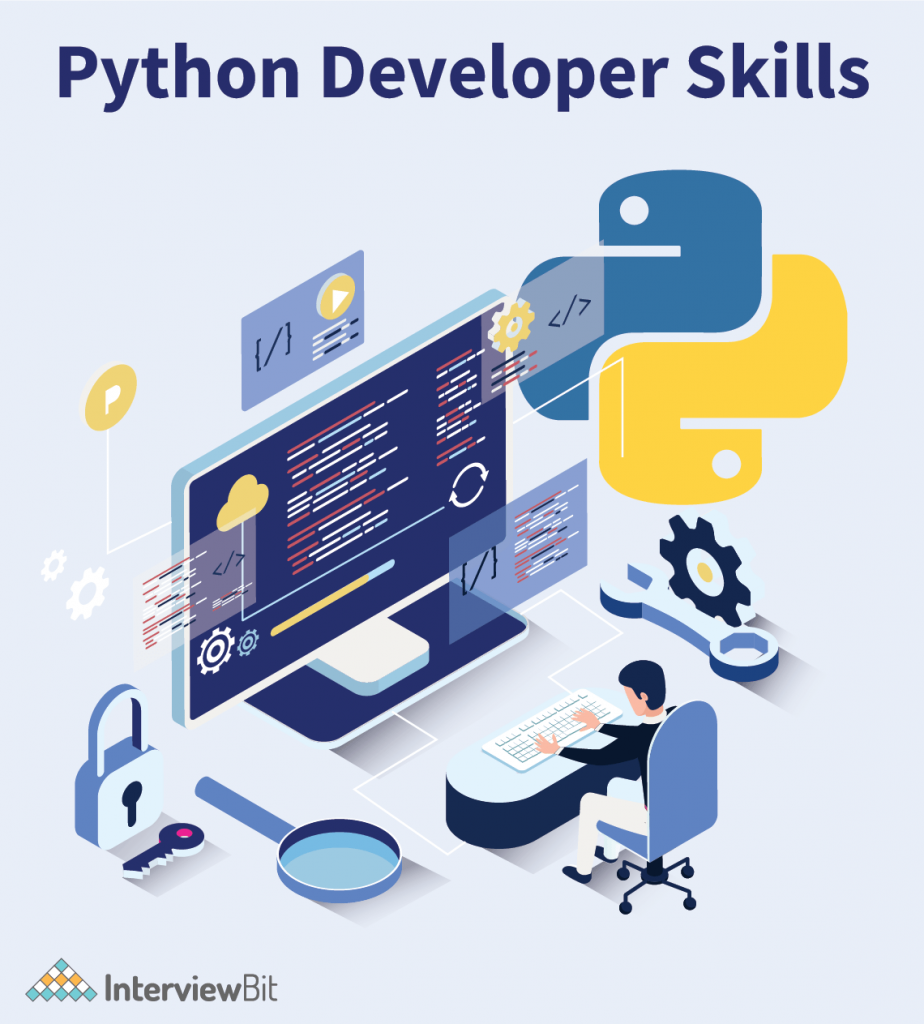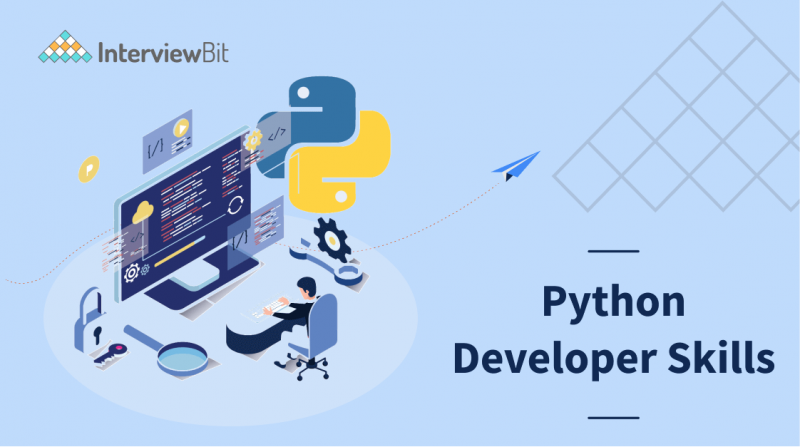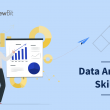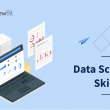If you’re considering getting into coding and if you are trying to comprehend the best first step, Python is what you are looking for. Python is a great choice if you have some background in coding or just exploring the idea of learning to code. Python is an easy-to-understand programming language that is versatile enough to develop web applications and more. Python is not the most popular language on the web. It is continually growing, primarily in a startup environment where time and funds are usually limited. As a language, Python is aspect-oriented, meaning there are modules with diverse functionality. So first, like any language the developer has to design the modules based on the “if then” action, and depending on the user’s action, the algorithm generates a particular block and delivers the result. The Python developer usually deals with backend components, computational services apps connection with the third-party web services, and offers support to the frontend developers in web applications. Of course, you might develop applications with the help of different languages but in most cases, Python is the language chosen for it. There are numerous reasons why developers prefer using this language:
- Python is highly readable as it is dynamically typed and mandates indentation
- It has several libraries, which makes it readily accessible to developers
- Python is a scalable language that makes it effortless to manage tasks of all sizes
- It is used to design prototypes and minimum viable products in a very short span of time
There are a set of skills that python developers need to learn as they are beneficial during work, interviews, or even while learning new skills on top of python. In this article, let us take a look at the top skills that a python developer should possess.
Who is Python Developer?
A Python developer makes use of the Python programming language, frameworks, and tools to design, program, and modify applications/websites. There are several roles and domains a Python developer can opt for. A Python Developer’s role can involve an extensive variety of duties. The role consists of coding, devising, executing, and debugging development projects, both on the back-end and server-side. The technological framework of the companies is looked after by python developers as well. A Python Developer works closely with analytics and data collection to formulate necessary answers to questions. Developers also provide valuable insight. Like other programming positions, the needs of this job vary based on the requirements of your employer. Some Python Developers work independently as contractors instead of working for one company.
Confused about your next job?
The career path to becoming a thriving Python developer is an interesting one. Many developers are looking forward to it. If you want to know how to become a Python Developer and advance a career in it, here are key tips that can help you in doing so:
- Create your projects in Python, and host them in your repository in Github. This functions more as your resume.
- Develop code that is easily understandable, accurately documented, and follows the important coding standards
- Read sufficient books on technology and learn perfectly developed peer code
- Improve your technology skillset by comprehending more about Python libraries
- Have good knowhow of AI and ML as they operate together with Python
- Take up ample freelancing projects with Python, to assist in creating a good experience
- Should contribute to the opensource community on platforms such as GitHub
- Keep your CV and profile updated on all crucial platforms
- Keep following online tutorials to improve your coding skills
- Learn ORM libraries, Python frameworks, front-end technologies, and version control systems thoroughly
In the role of Python developer, you are expected to do any of the following:
- Optimize data algorithms
- Create websites
- Resolve data analytics problems
- Implement data protection
- Secure websites
- Write reusable, effective, and testable code.
There are hundreds of companies that are actively seeking Python developers as you read this article. If you get a hold of the important Python developer skills, you won’t have any problems finding a job.
Python Developer Skills

If you are wondering what are the required technical abilities and soft skills for a Python developer? Let’s take a look at skills now!
Excellent Debugging Skills
Being a beginner-friendly language, Python is said to be easy to start your coding career. But there are several scenarios where you anticipate receiving a different output rather than the one you have got. A few of these cases can be when functioning with range() function, which results in an off-by-one error, failing to close a file, division by a negative number (resulting in an unwanted number that rounds towards the negative part of the number line), etc. Therefore, it makes it very important to have the skills of debugging. Some steps to debug are by just printing out variable values, modifying the path of the program, stopping the execution of some events, and using a debugger.
Experience with Python Frameworks
Frameworks reduce the development time by automating the implementation of redundant tasks. They empower developers to focus solely on application logic instead of routine elements.
Since Python is one of the best programming languages, there is no dearth of frameworks for Python and each framework has its own set of benefits and flaws. Thus, the choice has to be made based on the requirements of the project and the developer’s preference. The major plus point of using a framework in place of a library is its versatility Instead of writing comparable code for every project, Python developers can find pre-written components in the framework. It not only saves your money and time but also lessens time-to-market.. They are extensible and equip us with the required tools to increase their features. If you have a library, you have to know about each functionality to execute specific operations. However, with frameworks, it becomes comparatively simple owing to the structured control of the flow. Your work is to redirect our operations with the help of certain operations utilizing the functionalities already dominant in the framework. Though there is an end number of frameworks available in the market for web development, there are primarily three types of Python frameworks, namely full-stack, micro-framework, and asynchronous.
A few of the web frameworks ruling the market are:
Django
If you have decided to master one Python framework, make it Django. Django is super functional, a highly scalable, and fast framework. With Django, you can develop any web application from small projects to large corporate websites. Django is also the most sought-after for machine learning projects. Django has a vast user base, making it easy for debugging and seeking support from the community.
Flask
Flask is an exceptional skill for Python developers is much easier to learn for Python coders compared to Django. Flask is a necessary Python microframework you should know if you want to pursue the role of developer.
CherryPy
CherryPy, one of the most used Python microframeworks has a minimalistic approach. CherryPy enables Python developers to use any type of technology for data access, templating, etc.
Usage of Python Shell
Python offers a robust shell of its own that allows you to run commands in isolation and entirety. It is also known as REPL (read, evaluate, print, loop) which indicates it reads the command, evaluates it, prints the outcome, and awaits the next command. This text-based command prompt, Shell lets you test code without explicitly designing a file. As a python developer, you should understand how to utilize this python interpreter because it can cut down a lot of time during testing out new pieces of code.
Experience in core Python
Python Developer should know core python. The dearth of knowledge can lead to a negative impact on an individual as well as on the company also.
Python Developer should know of –
Iterators
Generators
OOP concepts
Data structure
Exception handling
Object Relational Mapper
ORMs (Object Relational Mappers) are a class of libraries that expedite the shift of data from a relational database to Python objects. In a nutshell, an object-relational mapper is a method that modifies data between incompatible types adopting object-oriented programming languages. ORMs can create a virtual object database, which is used within Python or any other language. The most important advantage for developers using an ORM library is that they can reduce a considerable amount of time by granting them the flexibility to change to another relational database when needed. Using ORMs, Python developers can keep writing in Python code rather than using SQL to build and update data schemas.
Python Libraries
Python has several exceptional benefits, and one of them is its extensive collection of libraries. As per the Python Package Index, Python has more than 267,000 projects. Well, this means there is a solid chance that whatever you’re trying to create, a package already exists that can make the development easier for you. When programmers intend to design something or are stuck in the middle of a project, they have access to all these libraries that have the required documentation and guidance. Below mentioned are some of the Python libraries that developers should use in their projects.
- TensorFlow- TensorFlow is one of the best Python libraries devised for executing out high-performance numerical and scientific calculations.
- Requests- Being an HTTP library, requests intends to make the task of designing and sending HTTP requests to your Python applications more comprehensible.
- Matplotlib- Matplotlib is unquestionably one of the most successful visualization libraries for Python. Being used by many businesses and individuals, Matplotlib allows you to visualize your data in many different ways.
- Peewee- Peewee enables developers to operate with databases without involving in the complexities of a relational database management system. The library backs many popular databases, including MySQL, SQLite, CockroachDB, and PostgreSQL.
Machine Learning and AI
We are residing in a digital time, which makes it almost difficult to move away from industries such as Artificial Intelligence (AI) and Machine Learning (ML). Even web apps can be extremely helpful by adopting these technologies. When Python developers work with this language and work with data science, they can further work with neural networks, data collection, data analysis, and data visualization having a vivid synopsis of your web application. Think about it, when Python developers are experts in data science, they can obtain, envision and interpret the information extracted from the data. This makes them have a transparent picture of where the business application is heading and even predict user behavior.
While interviewing for the role of a Python developer, it’s a huge advantage if you are an expert in AI/ML and Data Science. For this, you need to make sure you have a strong understanding of Machine Learning Algorithms.
Multi-process architecture
When designing a web application, to separate the application’s internal working from users, Python developers require a development architecture. Now, they have simpler frameworks and architecture models including the Model View Template architecture and the Model View Controller architecture. A Python developer should possess a basic knowledge of how their code will work during release or deployment environments. After learning about its architecture, they can distinguish and resolve the problems in the core framework to obtain optimized and excellent results.
List Comprehension and Slicing
Slicing and list comprehension are considered the most dominant features that are a part of Python. Slicing is implemented to strings/lists and is capable enough to carve out a part or subset of the list or string. It restricts you to connect through indices with ugly if conditions and makes the code look rich and fine. Talking about list comprehension, it is a mechanism to build a new list based on a current list or additional structures like strings. This reduces various lines of the loop into a single-line and easily understandable syntax.
Understanding front-end technologies (JavaScript, HTML5, CSS3)
Many a time, a Python developer has to agree with the frontend team to make match the server-side with the client-side. Hence, you must know how the frontend works, what is plausible and what is not, how the app is going to look. Of course, in proper agile software houses, there is also a UX team, Project Managers, Product Managers, and SCRUM master to regulate the workflow. It doesn’t imply that a frontend is an absolute must-know for Python developers but, in some cases, this kind of expertise and experience often comes handy.
Conclusion
We have taken a look at the most beneficial and essential skills you need to have as a python developer. Learning and exercising these will assist you to land a job and make you the most sought-after python developer. Most importantly, your skillset is your weapon. In programming you can always get to know more thus obtaining extra skills is not only advantageous but also makes a developer’s career path challenging and exciting. Other than discovering new libraries or taking part in must-attend Python conferences, there are several ways in which you can enhance your skills. Coding in your free time is a must- for that you need a lot of endurance. Secondly, taking up extra courses and webinars, teaching others, getting engaged in the programming community to finally find your thing, specific niche in which you want to become a champion.
FAQs
- Should I learn Python or SQL first?
Answer: We think that the best way to advance your career in web development is by taking up SQL lessons. SQL is an important tool for any type of data retrieval from relational databases, even though your initial job has limited or has nothing to do with data analysis.
- Which DB is best for Python?
Answer: PostgreSQL is the most acclaimed relational database for operating with Python web applications. PostgreSQL’s active development, feature set, and stability add to its usage as the backend for thousands of applications live on the Web today.
- How long will it take to learn Python?
Answer: Generally, it takes about two to six months to study the basics of Python. But you can read about Python enough to write your first brief program in a matter of minutes. Mastering Python’s vast collection of libraries can take months or years. You can check out this free course on Python to get started.
- Is Python enough to get a job?
Answer: Python is not enough to land up a job as most jobs demand a set of skills. Specialization is important, but technical versatility is also necessary. For example, you can get a job to draft a Python code that relates to a MySQL database. To develop a web application, you need to be thorough in Javascript, HTML, and CSS.
Additional Resources
- Learn Python
- Python MCQs
- Online Python Compiler
- How to Become a Python Developer
- Python Projects
- Python Interview Questions
- Python Developer Salary
- Features of Python
- Difference Between Python 2 and 3
- Python Frameworks
- Python Books
- Python Developer Resume
- Applications of Python
- Python Libraries
- More Python Developer Skills







 Join WhatsApp Group
Join WhatsApp Group


